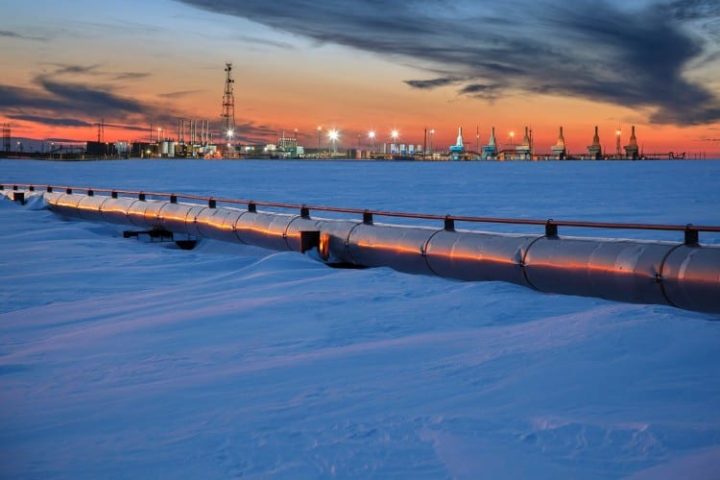
President Joe Biden has been great for Russian oil and gas producers, and for Russian President Vladimir Putin, whose country’s energy dominance and political dominance go hand in hand.
According to Just the News, new data from the International Energy Agency shows that the United States imported more petroleum products from Russia in March than it has in more than a decade.
The outlet reports that within months of President Biden halting the Keystone Pipeline, pausing new oil and gas leases on federal lands, and imposing further restrictions on U.S. oil companies in the name of countering “climate change,” U.S. imports of crude oil and other petroleum products from Russia set a new record, reaching 22.9 million barrels in March, the highest level since August 2010. Crude oil imports alone stood at 6.1 million barrels, making Russia the third-largest oil exporter to the United States.
“We saw a record 5.75 million barrels of Russian crude discharged in the U.S. [in May], and we’re projecting a further record this month of 7.5mn bbls,” ClipperData, a commodity intelligence company that monitors cargo shipments worldwide, reported June 7.
Biden’s agenda is harming American oil producers while “buttressing the Iranian and Russian industries,” Kathleen Sgamma, president of the Western Energy Alliance, said in a statement. He has “tipped us into oil dependence on Russia just a year after complete independence,” and has provided “a geopolitical gift” to the Kremlin, Sgamma continued.
Biden’s policies have resulted in U.S. oil production falling by 1.715 million barrels per day from a year ago, a void in large part being filled by Russia, Phil Flynn, senior energy analyst at the Price Future Group, wrote.
Energy Information Administration (EIA) data support this claim, and show that U.S. inventories of crude oil fell more than expected and domestic oil production also declined, all while demand continues to rise. As a result, the national average for gas prices went up.
In addition to all of that, the Biden administration lifted Trump-era sanctions on the companies behind Russia’s Nord Stream 2 gas pipeline that connects the world’s largest gas reserves in northern Russia to the European pipeline network. Just in March, Secretary of State Antony Blinken called the pipeline “a Russian geopolitical project intended to divide Europe and weaken European energy security.” He said the pipeline was a “bad deal” for Europe and that the Biden administration was “committed to complying” with bipartisan legislation to impose sanctions.
But in May, the State Department decided to waive sanctions in the interest of “rebuilding relationships with our allies and partners in Europe,” despite uncovering that the Swiss-based Nord Stream 2 AG and its CEO, Matthis Warnig, a Putin ally and former officer of the East German Stasi, engaged in sanctionable activity.
“I have been opposed to Nord Stream 2 from the beginning but it only has — it’s almost completed,” Biden said at the time, “To go ahead and impose sanctions now would, I think, be counterproductive in terms of our European relations.”
Now, the pipeline will be built, which is arguably a huge geopolitical win for Putin, since the gas exports will give him substantial new leverage in Europe.
During Trump’s term, a number of regulations were lifted off the American energy sector, which accelerated domestic crude oil production. It was a huge step on the path toward making America energy independent.
Moreover, Trump’s deregulation allowed America to compete with Russia and Saudi Arabia to be the world’s dominant oil and gas producer. The United States became a net natural-gas exporter in 2017 for the first time in almost 60 years, according to the EIA. U.S. exports of liquified natural gas (LNG) rose 58 percent through the first half of 2018 compared with the same period in 2017, with the rise continuing throughout 2019.
Yet under Biden, we are retreating from that race in the name of climate change. The administration argues the American pipelines threaten the environment, yet apparently it’s OK if Russia pollutes.
Arguably, energy production in Russia is a genuine environmental threat. Gazprom, the powerful oil and natural gas company, has a history of undertaking developmental projects that are poorly regulated and ecologically damaging. Baltic states such as Finland and Lithuania have expressed concerns that the pipeline, which will run through the Baltic Sea, poses a risk to delicate marine ecosystems. Similar discussions between cartographers, geologists, political scientists, and ecologists in Scandinavia emphasize the project’s potential to unearth dangerous, WWII-era mines that lie unexploded on the seafloor, thousands of unopened barrels of Nazi mercury, and other chemical munitions. Multiple environmental agencies raised serious concerns reflected in the lawsuits against the pipeline, saying, among other things, that “If EU member states are serious about their commitments to tackle climate change, they should use every tool in the box to stop Nord Stream 2.” Why is the Biden administration silent on this “global issue” that presumably “affects us all”?
The Biden administration’s actions only help to boost Russia’s political dominance while weakening the United States.




